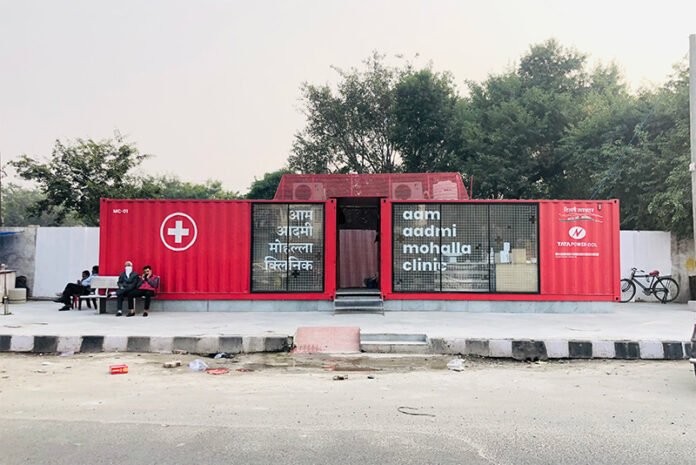Assam Chief Minister Himanta Biswa Sarma has raised concerns over the viability and effectiveness of Delhi’s “Mohalla Clinic” model, which was introduced by Delhi Chief Minister Arvind Kejriwal’s Aam Aadmi Party (AAP). Sarma, while addressing the importance of healthcare infrastructure, questioned whether the Mohalla Clinics, touted as a transformative health solution, could truly meet the healthcare needs of a rapidly growing urban population like Delhi.
Sarma, known for his outspoken views on various national issues, criticized Kejriwal’s emphasis on setting up small, neighborhood-based clinics, which have been hailed as a revolutionary model for providing primary healthcare services. During a recent public statement, Sarma remarked, “Kejriwal says he has transformed healthcare by setting up Mohalla Clinics, calling it the biggest health model in the country. But is there a system where hospitals can be built even on footpaths?” The statement indicated Sarma’s skepticism about the effectiveness of the Mohalla Clinic system in providing comprehensive healthcare solutions.
The Mohalla Clinic initiative, which started in Delhi, aims to provide basic health services such as free consultations, diagnostics, and medicines to the local community. However, Sarma pointed out that while these clinics might be able to address basic healthcare needs, they may not be sufficient to handle the growing complexities of healthcare requirements in a metropolitan area. He emphasized that Delhi, a city with a large population and increasing healthcare demands, needs more robust healthcare infrastructure, particularly large-scale medical institutions and medical colleges.
Sarma’s Criticism: A Call for Medical Colleges Over Small Clinics
In his statement, Sarma directly questioned whether the Mohalla Clinic model should be prioritized over the establishment of medical colleges in a major city like Delhi. “Why is Arvind Kejriwal talking about such a big hospital model, and should Delhi not focus on establishing medical colleges that can train the next generation of doctors and healthcare professionals?” he asked. His remarks highlighted a growing concern that while small clinics may provide temporary solutions for primary healthcare, they fail to address the long-term needs of an expanding population that requires access to specialized medical care and advanced treatments.
Sarma has long advocated for the establishment of medical colleges and large healthcare institutions to ensure that healthcare systems are sustainable and scalable. His view reflects a belief that having well-equipped hospitals, medical colleges, and advanced healthcare centers is crucial for not only providing quality healthcare to the population but also for creating a future-ready healthcare workforce. According to Sarma, medical colleges will play a vital role in educating and training healthcare professionals, ensuring that the country’s healthcare system continues to thrive in the face of new medical challenges.
Healthcare in India: Need for Comprehensive Solutions
Sarma’s criticism of the Mohalla Clinic model comes at a time when the healthcare system in India is under major strain, especially in urban areas like Delhi, where population growth, pollution, and lifestyle diseases are putting immense pressure on healthcare services. While Mohalla Clinics have indeed proven beneficial in addressing primary healthcare needs such as routine checkups and minor treatments, they may not be equipped to handle more complicated health conditions that require advanced diagnostic tools, specialist care, or surgical intervention.
India’s healthcare system, particularly in urban centers, faces a critical shortage of doctors, nurses, and medical professionals. There is a growing need for well-established medical institutions that can not only provide specialized care but also train the future workforce needed to meet the country’s healthcare demands. Establishing medical colleges in metropolitan areas like Delhi could go a long way in addressing these issues and ensuring that India’s healthcare system remains competitive and capable of handling both present and future challenges.
The Role of Medical Colleges in Strengthening Healthcare Infrastructure
Medical colleges play an indispensable role in strengthening healthcare systems. By training skilled professionals, they ensure that there is a continuous supply of doctors, nurses, and healthcare workers who are well-equipped to handle a variety of health challenges. Furthermore, medical colleges are often associated with teaching hospitals that provide specialized care and advanced medical treatments. This dual role of education and healthcare provision ensures that these institutions contribute to both the immediate healthcare needs of the population and the long-term sustainability of the healthcare system.
In addition, the establishment of medical colleges can provide a significant boost to the local economy by creating jobs, fostering research and development in medical science, and encouraging innovation in healthcare practices. By focusing on building large-scale healthcare institutions and medical colleges, Sarma believes that the government can create a more sustainable and long-lasting solution to the challenges faced by the healthcare sector.
A Balanced Approach to Healthcare
While Mohalla Clinics have undoubtedly made an impact in providing accessible healthcare services in densely populated urban areas, Assam Chief Minister Himanta Biswa Sarma’s critique of the model suggests the need for a more balanced approach to healthcare. Sarma advocates for the establishment of medical colleges and large healthcare facilities that can address the complex healthcare needs of an expanding population. While primary healthcare is essential, it is equally important to have specialized medical infrastructure that can provide comprehensive care and train the next generation of healthcare professionals.
India’s healthcare system needs to evolve to meet the challenges of the future, and a robust network of medical colleges and large-scale hospitals will play a crucial role in ensuring that the country’s healthcare system is sustainable, capable, and ready to tackle new health challenges.


